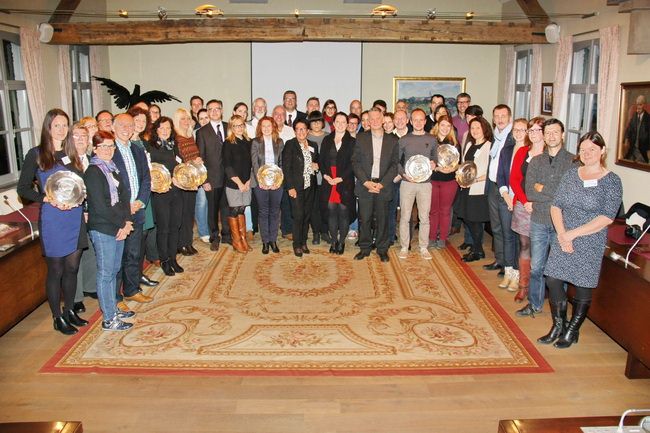From 20 to 21 October, the City of Rijeka took part in the initial conference of the “Easy Towns” project, held in Heist-op-den-Berg, Belgium. The “Easy Towns“ project is financed under the EU “Europe for Citizens” programme. The total project value amounts to EUR 145,000, and project partners are: Vicenza (Italy), Heist-op-den-Berg (Belgium), L’Alfas del Pi (Spain), Pforzheim (Germany), Pula (Croatia), Šentjur (Slovenia), Gozo (Malta), Niepolomice (Poland), Craigavon (UK – Northern Ireland) and Rijeka.
The key themes of the “Easy Towns“ project are: multiculturalism, interculturalism, and integration in European towns, while the project goal is to sensibilise and include citizens in discussion addressing these issues. The project partners will have an opportunity to share examples of good practice, as well as transfer knowledge and experience relating to the mentioned themes. All project partners, by the end of the project life (year 2017) will have performed actions in their respective cities, which objective is to talk about integration challenges, in a creative manner, in particular in cooperation with the youth population.
Being a multilingual and multicultural city and a participant in the international network that promotes interculture in cities – “Intercultural cities”, Rijeka presented its experience at the initial conference held from 20 to 21 October in Heist-op-den-Berg, Belgium. On this occasion, the candidature of Rijeka for the European Capital of Culture in 2020 was presented, with a particular emphasis on the topic of “The Port of Diversity” and migration as one of the backbones of the “Rijeka2020” programme.
 “Europe for Citizens” is a programme that provides financial support to projects promoting “active European citizenship“. The programme strives to strengthen citizen participation by enabling them to discuss and exchange opinions on the EU, strengthen the European identity, develop a sense of belonging to the EU and promote intercultural dialog among citizens. The Programme is a response to the necessity of more active citizen participation in the construction of Europe and encourages cooperation between citizens and their organisations in different countries with the aim of meeting, common action and developing their own ideas about the European environment, while respecting their mutual differences.
“Europe for Citizens” is a programme that provides financial support to projects promoting “active European citizenship“. The programme strives to strengthen citizen participation by enabling them to discuss and exchange opinions on the EU, strengthen the European identity, develop a sense of belonging to the EU and promote intercultural dialog among citizens. The Programme is a response to the necessity of more active citizen participation in the construction of Europe and encourages cooperation between citizens and their organisations in different countries with the aim of meeting, common action and developing their own ideas about the European environment, while respecting their mutual differences.

 “Europe for Citizens” is a programme that provides financial support to projects promoting “active European citizenship“. The programme strives to strengthen citizen participation by enabling them to discuss and exchange opinions on the EU, strengthen the European identity, develop a sense of belonging to the EU and promote intercultural dialog among citizens. The Programme is a response to the necessity of more active citizen participation in the construction of Europe and encourages cooperation between citizens and their organisations in different countries with the aim of meeting, common action and developing their own ideas about the European environment, while respecting their mutual differences.
“Europe for Citizens” is a programme that provides financial support to projects promoting “active European citizenship“. The programme strives to strengthen citizen participation by enabling them to discuss and exchange opinions on the EU, strengthen the European identity, develop a sense of belonging to the EU and promote intercultural dialog among citizens. The Programme is a response to the necessity of more active citizen participation in the construction of Europe and encourages cooperation between citizens and their organisations in different countries with the aim of meeting, common action and developing their own ideas about the European environment, while respecting their mutual differences.